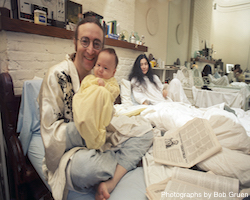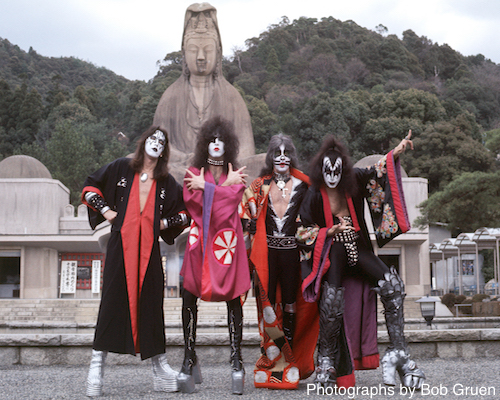Bob Gruen is one of the most well-known and respected photographers in rock and roll today. By the mid-1970s, he was already regarded as one of the foremost documenters of the music scene, working with major artists such as John Lennon and Yoko Ono, Tina Turner, the Rolling Stones, Led Zeppelin, The Who, Elton John, KISS, Aerosmith, David Bowie and Alice Cooper as well as covering emerging new wave and punk bands including the New York Dolls, Patti Smith, the Clash, the Sex Pistols, the Ramones and Blondie. Tokyo Journal ’s Executive Editor Anthony Al-Jamie interviewed his colleague and fellow Tokyo Journal columnist Bob Gruen about his remarkable career.
TJ: How did you get started in your career?
GRUEN: Photography was my mother’s hobby and she taught me to develop and print my photos. After high school, I lived with a rock band and took photos of them, and when they got a record deal they used my photos and I started to meet people in the business.
TJ: How many times have you been to Japan?
GRUEN: I’ve been to Japan 17 times since my first trip with Yoko Ono in 1974. In 1979, I got an apartment in Harajuku that I kept until the spring of 1980.
TJ: What do you like about Japan?
GRUEN: Everything! Especially the food, the beauty everywhere, the efficiency and advanced technology and the respect for art and artists.
TJ: What has been your most memorable experience in Japan?
GRUEN: Leading a photo session with KISS around famous sites in Kyoto while being followed by hundreds of people was fun, but visiting real friends at their homes is more memorable.
TJ: Do you prefer shooting with film or digitally?
GRUEN: I’m not particular about one or the other. I’m more interested in the image created. But digital is easier and it’s what’s happening today, so I shoot digitally.
TJ: What have been the biggest changes in the music and photography business over the past 40 years?
GRUEN: The corporate takeover of the business and the digital revolution making everything available to everyone, anywhere, all the time.
TJ: Where do you see the future of music and photography heading?
GRUEN: I learn from the past, look to the future, but I live in the present. The future is unwritten.
TJ: How did drugs impact your career?
GRUEN: At first I thought it would be fun. Then they helped me stay awake to do more. Then they were an escape from the pressure. Then they finally almost killed me and I wish I had quit sooner.
TJ: Can you share with us an experience that you think de ned the ‘70s?
GRUEN: Led Zeppelin with open shirts in front of their giant jet plane shows the excesses of the times.
TJ: I understand back in the early ‘70s you were recording videos of live performances. Do you still take videos?
GRUEN: I had the first portable video recorder. I could operate it myself and make simple tapes. It was a good way to show people what they couldn’t see otherwise. By the mid-seventies, video developed into a much larger business and I wasn’t interested in that.



TJ: In your perspective, what’s the difference between a good rock photographer and a great rock photographer?
GRUEN: A good photographer takes pictures of what’s going on. A great one cap- tures the feeling of what’s going on.
TJ: When you go to photograph something, what do you take with you? Why?
GRUEN: I go with a feeling that I hope to get some good pictures, but the knowledge that I might fail. So I just try to stay in the moment and do the best I can.
TJ: What is the one thing you wish you knew when you started taking photos?
GRUEN: That I was going to be doing it forever.
TJ: What are the pros and cons of being a photographer?
GRUEN: You get to go to interesting places and meet interesting people, but you don’t make much money.
TJ: Are there any celebrities who are no longer with us that you wish you could have photographed?
GRUEN: Otis Redding.
TJ: Is there someone who inspired you?
GRUEN: Man Ray, who made art with photography; Henri Cartier-Bresson, who captured the decisive moment; and Arthur Fellig, known as Weegee, who was always in the right place at the right time.
TJ: I understand you’re friends with Mick Rock, who also spends a lot of time in New York.
GRUEN: Mick and I are good friends and he’s done some great work.
TJ: What was your favorite thing about photographing John Lennon?
GRUEN: Developing a friendship with someone with such a great sense of humor.
TJ: What made John Lennon unique and different from all other musicians during his time?
GRUEN: He had a talent to express in simple words the thoughts we all have.
TJ: Can you tell us about an exciting or interesting experience you had with John Lennon?
GRUEN: It was always exciting to be with John Lennon, but especially when we went to the Statue of Liberty and made an important photo about personal freedom.
TJ: What’s your favorite photo you took of John?
GRUEN: The one of John with a very big smile as he holds baby Sean
TJ: What was your favorite thing about traveling to Japan with KISS?
GRUEN: Staying at Hotel Okura in Tokyo for a month with unlimited expenses.
TJ: Can you tell us about the biggest error you’ve ever made in your career?
GRUEN: Too many to count!
TJ: Have you ever left the film out of the camera?
GRUEN: Yes, and it’s very embarrassing.
TJ: Do you have any regrets? If you could go back and do something over again, what would it be?
GRUEN: I try not to look back because the past can’t be changed.
TJ: What are some of your favorite photos you’ve taken?
GRUEN: I put my 500 favorites in my book Rock Seen.
TJ: What has been your proudest achievement?
GRUEN: Surviving as long as I have.
TJ: Can you tell us about your current projects?
GRUEN: A new book of my 40+ years of photos of Yoko Ono entitled See Hear Yoko was released in February 2015 and my book of Clash photos is being reissued. I have several exhibitions in the works in South America, England, Finland and other places.
TJ: What are your goals for the future?
GRUEN: To live long and prosper.
TJ: What advice would you give to an aspiring photographer?
GRUEN: I tell people who like to take pictures to take a lot of them. Then they are bound to get some good ones and if you only show the good ones, people will think you’re good... But don’t give up the day job.
TJ: How do you define happiness?
GRUEN: I don’t. But when John Lennon was asked in school what he wanted in life, he said he wanted to be happy. The teacher told him he didn’t understand the question, and John said she didn’t understand life. tj
The complete article is available in Issue #277. Click here to order from Amazon.




























